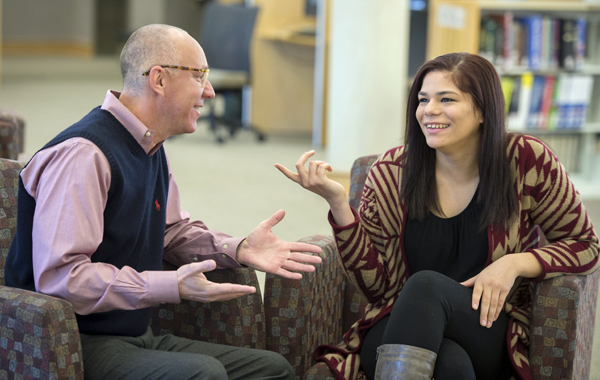
Student Ashleigh Harris-Gates gets advice from professor William Price; both were the first in their families to attend college. (photo by Bill Roa)
Dunwoody initiative to aid first-generation students
Ashleigh Harris-Gates pretty much has this college thing down now. But, it wasn’t always so.
The Georgia Perimeter College sophomore recalls feeling a bit overwhelmed three years ago when she and her mother worked through the college application process, which included filling out the lengthy federal financial aid packet and selecting the right classes.
It was a tense time, exacerbated by an anxiety episode Harris-Gates had suffered—and the weight of being the first in her family to attend college.
“My mom, she wants it for me so bad,” the Dunwoody student says. “It’s like a really good feeling, but it’s a lot of pressure.”
Harris-Gates wants it badly too, and she’s on a good track with a high GPA and no panic attacks lately. After graduating from Georgia Perimeter this spring, she plans to transfer to Kennesaw State University and double major in communications and psychology. Her goal is to get a master’s, become a school counselor and also speak publicly about managing and overcoming anxiety disorder.
In the meantime, she’s delighted to hear that GPC has launched what’s being called the First Generation program, an initiative aimed at helping the 2,400 Dunwoody Campus students just like Harris-Gates who are the first in their family to pursue a college degree.
Dr. Margaret Ehrlich was the Dunwoody dean of academics last semester when First Generation kicked off, along with Majors Matter, a second graduation and retention initiative. That program’s goal is to help students identify majors, focus on progress and plan how to successfully complete their degrees.
Ehrlich, known as the driving force behind the initiatives, tapped communications professor William Price, a first-generation college graduate himself, and about 20 other GPC faculty/first gen’s to serve as First Generation leaders.
One of their roles is to mentor students who venture down the road of becoming their family’s first college graduate. The idea is that instructors like Price can bring forth wisdom and experiences from having been there themselves.
“This is a population of students that might really be flying under the radar,” Price says.
The First Generation initiative, he believes, can do a lot to address their needs. But instead of shoving a bunch of programs and workshops at first-generation students, faculty organizers decided to first find out what are their interests.
So, last fall, faculty invited first-generation students to a Dunwoody Campus meet and greet, during which time students answered a survey about their experiences. They were asked questions pertaining to any admissions barriers faced and the most challenging aspect of being a first-generation student. To the latter question, the most common responses included pressure to succeed and financial support. Students also expressed a desire to receive time management and study skills strategies, among others.
“Our goal was to find out what do they feel, what do they need, what are they interested in—do they want a support group, do they want workshops?” Price says.
Program coordinators still are aggregating the information, with intentions to base future activities on survey responses. If all goes well on Dunwoody Campus, the program could be replicated on other campuses too.
Any assistance, according to Harris-Gates, will be beneficial. “It’ll definitely help first-generation kids know what to do and get more support,” she says.
